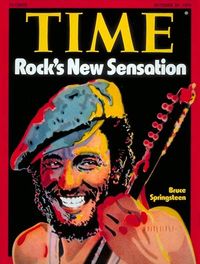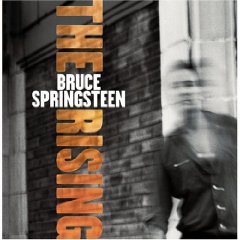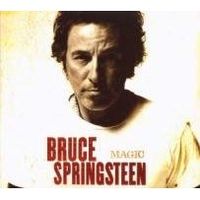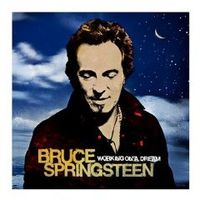
Before the decade ends, my nominee.
It's not Harry Potter, good as that was. It's not something from Green Day, also quite excellent.
It's the Boss. Bruce Springsteen.
Springsteen's three studio albums of this decade are the symphony of these times. Each is a masterpiece. Taken together they tell a coherent story. No other artist of the rock era has accomplished anything like this. Some have done great albums that told the story of a moment in time, but none has tackled a whole decade.
By the year 2000, moreover, Springsteen was already entering his sixth decade, a time when most rock artists have long-ago retired, given in to self-parody, or gone on the "oldies" circuit. Rock is a young man or woman's game, always has been. The Boss could have easily rested on his laurels.
Then 9-11 happened.

Every song carries the fall of the towers as a subtext, examining what happened from all angles, starting with the deeply personal Lonesome Day. (And note how he's almost not there on the cover, as though he too died that day. As we all did.)
The story actually begins at its end. Springsteen wrote My City of Ruins about his own Asbury Park, but when a concert was needed right after the event, a collective mass, he came onstage and opened the show with it. Just him and his guitar. The version on this album is a full-blown studio package, complete with background choir. The first version was an immortal performance.
There's plenty of other songs to cry over, of course. Into the Fire deals directly what what happened to hundreds of cops and firemen. Empty Sky deals with what happened to all of us for months afterward, looking to the place where the towers once stood. You're Missing may be one of the finest songs of personal loss ever recorded.
But there's more. The title track is a religious service of renewal, of taking action against the grief. (It was later used to introduce Joe Biden in the 2008 campaign.) Nothing Man tells the story of the war that had not yet come in Iraq. Let's be Friends (Skin to Skin) seeks peace, and Paradise attempts the paradoxical (and frightening) entry into the mind of a suicide bomber.
Then came Bush.

Every song on this album burns with a righteous hatred of the Iraq War, the Administration that launched it, and the people who supported it.
Its crowning achievement, in my eyes, is The Last To Die, which takes the 1973 words of John Kerry (whom he'd supported to the end, singing for him in Cleveland on election eve) and turns them into an indictment. It also tells a story, of Americans serving, suffering, and coming home from the war, mangled inside as well as out, and how supposedly patriotic Americans were even then looking away, too often, as they had looked away from Kerry's generation of soldiers, thinking them losers.
The instant amnesia of Americans to what was happening is Springsteen's theme throughout the album. Radio Nowhere uses hard rock to tell that, Livin in the Future and Girls in Their Summer Clothes tell it through satire and wistful middle age.
Then there's The Devil's Arcade, perhaps the most complete story song Springsteen had written since New York Serenade in 1973. It runs almost 10 minutes. It's not designed for airplay. It's designed to be heard the way a concert piece is heard, respectfully. It tears your heart right out of your chest and shows it to you. This is what those chickenhawks in Washington and their followers did to our best and bravest.
And there seems nothing to be done about it. Until…

What redeemed Springsteen, the only thing that can redeem any of us in the end, was love. In this case the love of Patty Scialfa, his wife of two decades now, who lives with him in New Jersey and keeps a private life for him even while she remains a back-up singer in the band. (Neat trick.)
He has two love songs for Patty on this album, This Life and Kingdom of Days. Both are proof that love is not just for the young, that it's commitment and a calm in the midst of all storms. I wonder if anyone has written so well about middle-aged love, about love by the banked fire, about the satisfaction of just holding someone who completes you and gives you peace.
His story song opens the album this time. Outlaw Pete starts off bad, tries to become good, finds he can't and commits suicide, leaving behind hope in the form of a daughter. It's a tragic tale, a very American tale, because there is no redemption possible once an outlaw has crossed the line, not really, not in this country.
The title track is what we're all left with. Working on a Dream means just that. Doing what must be done today to make tomorrow better for those around us. It's a great working man's song. Springsteen has always been more popular among the white collar crowd than the blue, although he sings for the man who works with his hands. That's not his fault, nor is it his problem. An artist does what he or she does. The audience chooses how it will.
One more point before I leave. Springsteen is a favorite of reporters. He was given the cover of both Time and Newsweek in the wake of his 1975 album Born to Run. He got the same treatment for The Rising.
Given the reputation of my profession it helps to remember this aphorism. Every once in a while even a blind squirrel finds a nut.









